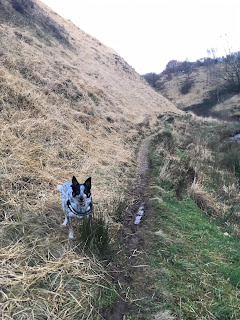My biggest reason for joining the cops was to do with protecting weak and vulnerable people. I love the idea of riding quickly to someone's aid, whisking them to safety and/or vanquishing the foe. In short, bullies get my goat. I suppose that's why I hate Domestic Violence so much. People think Domestic Violence is about relationships or misplaced love. It's not: it's about power and vulnerability.
Last week we were called to a Domestic Dispute at a house we knew well. We didn't need the radio operator to tell us of the long list of domestic incidents, nor the DV Marker on the premises; so we knew we needed to hurry up and get there. The front door was open and on top of the angry masculine shouts, we could hear furniture going over. This, it turned out was him trying to get to her as she scurried, animal-like out of his reach around the furniture. When we got in she was cowering on the floor in the corner, behind the dining table. She was about 7 stones wet through, lank mousey hair - in fact everything about her was mousey, probably because she'd never been allowed to be anything else.
She stared up at us resentfully, wiping blood and snot from her nose, mascara all over her eyes. Don't be surprised it was resentment rather than gratitude. She knew from experience that the best way to get through it was to weather the storm until his anger was spent. Our intervention would probably only make it worse next time she incurred his wrath, by looking at him the wrong way or saying something during Hollyoaks or something.
The moment that made me doubt myself was when we went through the door. The bastard stopped and turned as we shouted "Police!", and rather than run, or fight, he simply turned with a smirk, hands held up submissively. It was the smirk that got to me. I've seen that look a hundred times, it said: "Come on then, let's get it over with. Cart me off. She won't press charges and I'll be back tomorrow" Up until that point, everything about our approach had been professional: fast, safe driving, due consideration to the vulnerability of the victim, and a determination to do the right thing with the perpetrator, using all the criminal justice weapons at our disposal. When he smirked I wanted him to fight, to try to escape, to do something that allowed me an excuse to use as much lawfully justifiable force as I could; anything to release the choking lump of anger in my chest.
In the event I forced him forwards, unresisting, over the table, dragging his passive arms behind him to cuff him, for the ride in the van to the station. I thought I was in control but as I ratcheted on the cuffs round his wrists, he shouted, "Agghhh, you bastard!" The metal bracelets of the Kwik-Cuffs had bitten deep into his flesh. Slackening them off I could see the red welts I had caused and wanted to think that I had simply cuffed him quickly, to restrain a violent offender as rapidly and safely as possible. But as much as that was partly true - after all it's what we're trained to do - it wasn't the whole story.
I had wanted to lean over him, pushing his head into the table surface, put my mouth close to his ear and whisper: "How do you like it you snivelling piece of shit" I didn't do it; but I had wanted to. Why am I bothered? After all, we are only human aren't we? The point that's eating me is that the one thing that makes the difference between good and bad is no more than the split second it takes to decide.
We could all go one way or another. In that tiny moment of time, I could easily have become just as big a bully - with my cuffs, my CS spray, my ASP baton and big gang of mates - as him. What scared me was how easy it would have been to have gone the other way. I can understand how soldiers do very bad things in war and how good people can go bad. I used to think that the 'thin blue line' was a reference to the small number of Police Officers lined up against a raging hoard, now I think it's a description of the line we have to tread.
My dad always has something useful to say about stuff like this. This time he said two things. Firstly he pointed out that bobbies are sometimes given awards for heroic acts - we call them Commendations. I have never had one. My dad said that the really heroic acts aren't those done under extreme circumstances on the spur of the moment, but rather the small but equally as difficult decisions to do the right thing that we make dozens of times a week. So, I'm a hero in my dad's eyes - I like that. Then he said that it's not just me who has had to decide things in this incident. That mousey little weak woman also had to decide things: to stay or to go, for example. So, it's not my job to jump on the head of the bastard who beat her...I will go back to finish the job and help her decide to do the right thing. If you know someone who needs help, try this link.



